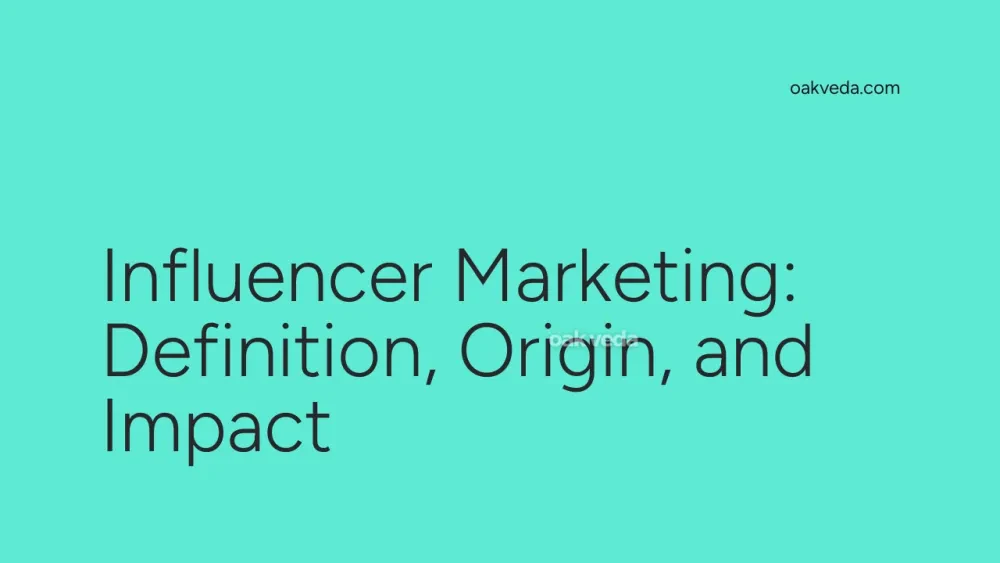
What is Influencer Marketing?
Influencer marketing is a powerful digital strategy that leverages the reach and credibility of individuals with a significant following on social media platforms to promote brands, products, or services. This approach taps into the trust and connection influencers have built with their audience, allowing companies to reach potential customers in a more authentic and engaging way than traditional advertising methods.
Origin and Development of Influencer Marketing
While the concept of using popular figures to endorse products isn't new, influencer marketing as we know it today emerged with the rise of social media platforms in the mid-2000s. Initially, brands partnered with bloggers and early YouTube stars. As platforms like Instagram, TikTok, and Twitter gained prominence, influencer marketing evolved into a sophisticated, multi-billion dollar industry.
How Influencer Marketing Works
Influencer marketing operates on the principle of social proof and word-of-mouth marketing in the digital age. Here's a breakdown of the process:
- Identification: Brands identify influencers whose audience aligns with their target market.
- Collaboration: They partner with influencers to create content that promotes their products or services.
- Content Creation: Influencers produce and share sponsored content, often integrating the brand naturally into their usual content style.
- Audience Engagement: Followers interact with the content, potentially leading to increased brand awareness and sales.
- Measurement: Brands track the campaign's performance using metrics like engagement rates, click-throughs, and conversions.
Types of Influencer Marketing
Influencer marketing can take various forms, including:
- Sponsored Posts: Influencers create content featuring the brand's product or service.
- Product Reviews: Influencers provide honest feedback about a product they've tried.
- Brand Ambassadorships: Long-term partnerships where influencers consistently promote a brand.
- Affiliate Marketing: Influencers earn a commission for sales generated through their unique links.
- Takeovers: Influencers temporarily manage a brand's social media account.
Popular Examples of Influencer Marketing
Some notable influencer marketing campaigns include:
- Daniel Wellington: The watch brand built its empire largely through Instagram influencer partnerships.
- Gymshark: This fitness apparel company grew exponentially by collaborating with fitness influencers.
- Fyre Festival: While ultimately a cautionary tale, it demonstrated the power of influencer marketing in generating buzz.
Impact of Influencer Marketing on Social Media Culture
Influencer marketing has significantly shaped social media culture:
- It has blurred the lines between personal content and advertising.
- It's created new career opportunities for content creators.
- It's influenced consumer behavior, with many people looking to influencers for product recommendations.
- It's changed how brands allocate their marketing budgets, with many shifting funds from traditional advertising to influencer partnerships.
Controversies Surrounding Influencer Marketing
Despite its effectiveness, influencer marketing has faced several challenges:
- Transparency Issues: Concerns about undisclosed sponsored content led to stricter regulations.
- Fake Followers: Some influencers artificially inflate their follower counts, leading to questions about authenticity.
- Oversaturation: As more brands adopt influencer marketing, there's a risk of audience fatigue.
- Measuring ROI: Determining the exact return on investment can be challenging for some campaigns.
How Brands and Influencers Use Influencer Marketing
Brands use influencer marketing to:
- Increase brand awareness
- Reach new target audiences
- Build trust and credibility
- Drive sales and conversions
- Gather user-generated content
Influencers benefit by:
- Monetizing their following
- Building their personal brand
- Gaining access to exclusive products or experiences
- Establishing themselves as thought leaders in their niche
Future Trends in Influencer Marketing
The future of influencer marketing looks bright, with several emerging trends:
- Micro and Nano-Influencers: Brands are increasingly partnering with influencers with smaller, highly engaged audiences.
- Long-Term Partnerships: There's a shift towards ongoing collaborations rather than one-off sponsored posts.
- Video Content: With the rise of TikTok and Instagram Reels, video-based influencer content is becoming more prevalent.
- Authenticity and Transparency: There's a growing emphasis on genuine, transparent partnerships.
- Performance-Based Deals: More brands are opting for affiliate-style arrangements where influencers earn based on actual sales or conversions.
FAQs about Influencer Marketing
-
Is influencer marketing effective? Yes, when done correctly, influencer marketing can be highly effective in building brand awareness and driving sales.
-
How much does influencer marketing cost? Costs vary widely based on the influencer's reach, engagement rate, and the scope of the campaign. It can range from free products for micro-influencers to millions of dollars for celebrity endorsements.
-
How do you measure the success of an influencer marketing campaign? Success can be measured through metrics like engagement rate, reach, impressions, click-through rates, and conversions.
-
Are there regulations for influencer marketing? Yes, many countries have regulations requiring influencers to disclose sponsored content clearly.
-
Can small businesses use influencer marketing? Absolutely! Small businesses can effectively use micro-influencers or local influencers to reach their target audience.
Influencer marketing has revolutionized the way brands connect with consumers in the digital age. As social media continues to evolve, so too will the strategies and applications of influencer marketing, making it an exciting and dynamic field to watch in the coming years.
You may be interested in:
- Archiving on Social Media: Definition, Origin, and Impact
- Boy Math: Definition, Origin, and Impact on Social Media
- TikTok Conversations: Definition, Origin, and Impact
- Not Me (??): Definition, Origin, and Impact on Social Media
- Unwell: Definition, Origin, and Impact on Social Media
- GIF: Definition, Origin, and Impact on Social Media

